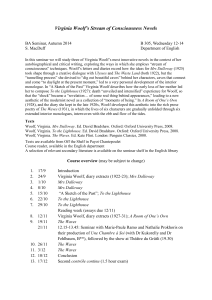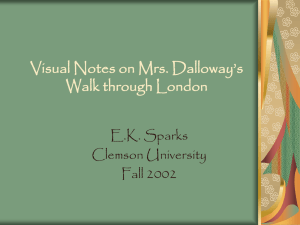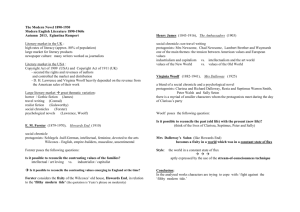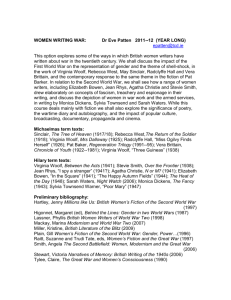Outline for Seminar
advertisement
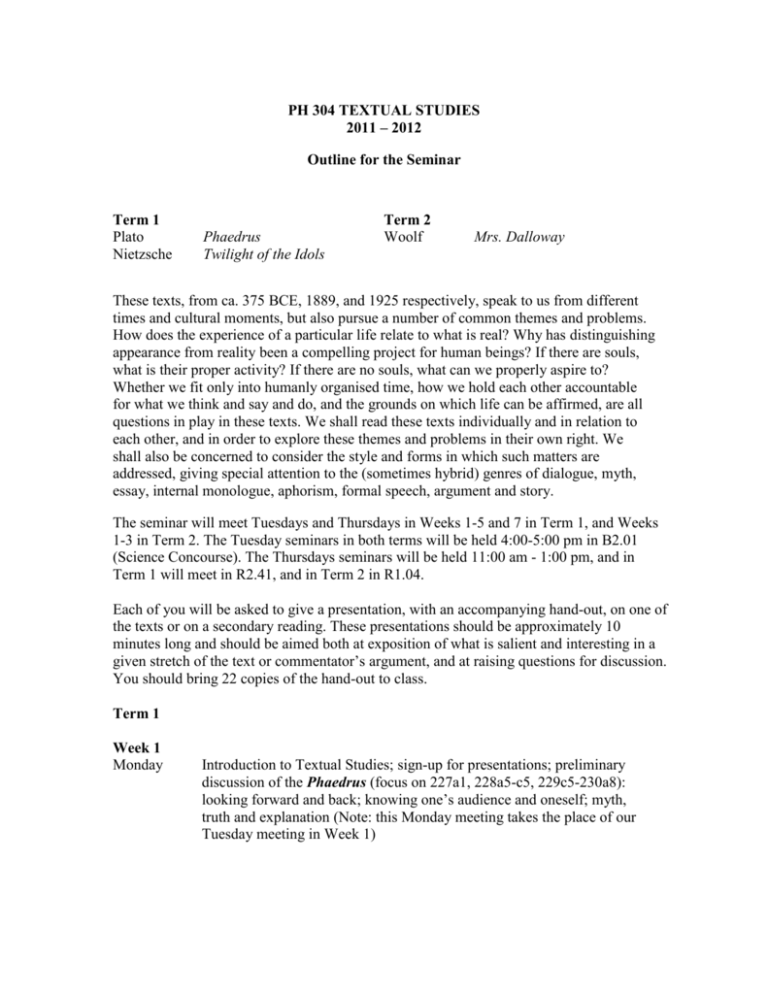
PH 304 TEXTUAL STUDIES 2011 – 2012 Outline for the Seminar Term 1 Plato Nietzsche Phaedrus Twilight of the Idols Term 2 Woolf Mrs. Dalloway These texts, from ca. 375 BCE, 1889, and 1925 respectively, speak to us from different times and cultural moments, but also pursue a number of common themes and problems. How does the experience of a particular life relate to what is real? Why has distinguishing appearance from reality been a compelling project for human beings? If there are souls, what is their proper activity? If there are no souls, what can we properly aspire to? Whether we fit only into humanly organised time, how we hold each other accountable for what we think and say and do, and the grounds on which life can be affirmed, are all questions in play in these texts. We shall read these texts individually and in relation to each other, and in order to explore these themes and problems in their own right. We shall also be concerned to consider the style and forms in which such matters are addressed, giving special attention to the (sometimes hybrid) genres of dialogue, myth, essay, internal monologue, aphorism, formal speech, argument and story. The seminar will meet Tuesdays and Thursdays in Weeks 1-5 and 7 in Term 1, and Weeks 1-3 in Term 2. The Tuesday seminars in both terms will be held 4:00-5:00 pm in B2.01 (Science Concourse). The Thursdays seminars will be held 11:00 am - 1:00 pm, and in Term 1 will meet in R2.41, and in Term 2 in R1.04. Each of you will be asked to give a presentation, with an accompanying hand-out, on one of the texts or on a secondary reading. These presentations should be approximately 10 minutes long and should be aimed both at exposition of what is salient and interesting in a given stretch of the text or commentator’s argument, and at raising questions for discussion. You should bring 22 copies of the hand-out to class. Term 1 Week 1 Monday Introduction to Textual Studies; sign-up for presentations; preliminary discussion of the Phaedrus (focus on 227a1, 228a5-c5, 229c5-230a8): looking forward and back; knowing one’s audience and oneself; myth, truth and explanation (Note: this Monday meeting takes the place of our Tuesday meeting in Week 1) Thursday Phaedrus: in praise of the non-lover, shameful speech Presentation on Lysias’ speech and the interlude between the first two speeches (230e-234c, 234c-237b) Presentation on Socrates’ first speech and his recantation (237b-241d, 241d-243e) Week 2 Tuesday Phaedrus: in praise of the lover, the need for poetic speech Discussion of the first part of Socrates’ second speech, kinds of madness and the self-moving soul, the fable of the horses and charioteer (243e246a, 246a-250c) Presentation on the final part of Socrates’ second speech, beauty and erotic love (250c-257b) Thursday Phaedrus: taking stock … love and the individual, myth and philosophy Presentation on Nussbaum’s “This story isn’t true”: madness, reason and recantation in the Phaedrus’, in The Fragility of Goodness Presentation on Ferrari’s Listening to the Cicadas (e.g., on the importance of the background and what the cicadas sing, or the chapter on ‘Love among the philosophers’) Week 3 Tuesday Phaedrus: rhetoric and truth, writing and speech Discussion of rhetoric as a science, on the analysis of the speeches, and collection and division (259e-266c) Thursday Phaedrus: concluding session, on love and rhetoric, knowing one’s own and others’ souls Presentation on leading souls and the myth of Thamus and Theuth (271c-277a) Presentation on Griswold on ‘Dialogue and Writing’ in SelfKnowledge in Plato’s Phaedrus Recommended reading: Jacques Derrida, ‘Plato’s Pharmacy’ Discussion on the dialogue as a whole—is it ‘put together like a living creature’ (264c)? Week 4 Tuesday Thursday Introduction to Twilight of the Idols Discussion of the ‘Foreword’ and ‘Epigrams and Arrows’ Twilight of the Idols: Central figures—ideals or idols? Presentation on the figure of Socrates (see esp. pp. 12-17) Presentation on the figure of Dionysus (see esp. pp. 21-22, 56-57, 6162) Consider role of other prominent figures (e.g., Goethe, see pp. 45-6 83-85, 89-90). Week 5 Tuesday Twilight of the Idols: Critique of philosophy Presentation on ‘“Reason” in Philosophy’ and ‘How the “True World” Finally Became a Fiction’ Thursday Twilight of the Idols: Life, will and strength Presentation on ‘Morality as Anti-Nature’ and ‘The Four Great Errors’ Presentation on Risse, ‘Nietzschean “Animal Psychology” versus Kantian Ethics’ Week 6 Independent Study Week (no seminars) Week 7 Tuesday Twilight of the Idols: Style, art and creation Discussion of ‘Raids of an Untimely Man’. esp. sections 1, 5-10, 20-25 Recommended reading: Reginster, ‘The Will to Power and the Ethics of Creativity’ ESSAY: Submit two copies of a 1-2 page essay plan, including a preliminary bibliography, in class. Thursday Concluding session: on Nietzsche and ‘untimely’ creation Presentation on ‘What I Owe to the Ancients’ and ‘The Hammer Speaks’ Recommended reading: Warner, ‘Nietzsche’s Philosophical Hammer’, esp. pp. 265-297 Weeks 8-10 Tutorials (to be held in CB’s office, H 508) Term 2 Week 1 Tuesday Introduction to Mrs. Dalloway Woolf and modernity; modernist narrative; the woman artist/writer; Woolf’s view of the modern novelist’s task; what it means to represent ‘reality’ or ‘life’ in fiction (MD pp 2-12, up to ‘her fault’). Recommended reading: Rachel Bowlby, ‘Introduction’ to The Crowded Dance of Modern Life, also in Feminist Destinations ‘Modern Fiction’ in The Crowded Dance of Modern Life (Penguin) pp512; also in Collected Essays Vol II; Essays 4: 157-65; The Common Reader, II; (focus on paragraph ‘Look within…custom would have us believe it’) ‘Mr Bennett and Mrs. Brown’, in A Woman’s Essays, pp 69-87; also in Collected Essays I: The Captain’s Death Bed; (focus on paragraph ‘For what after all is character…the lady still escapes him’) Thursday Time, Memory, and Subjectivity The ‘day-in-a-life’ novel; the representation of everyday life; narrating duration and ‘free indirect discourse’; Clarissa Dalloway as ‘central’ consciousness? Presentation: Temporality in Mrs. Dalloway (MD 25 -43, up to ‘his future’; MD 128-132, Clarissa once…perhaps; MD 108, ‘Big Ben…trifles’) Recommended reading: Fernihough, Anne. ‘Consciousness as a Stream’ in The Cambridge Companion to the Modernist Novel Presentation: the relationship between narrator and characters in Mrs Dalloway (MD 101-4, ‘He must be off…every instant’) Recommended reading: J. Hillis Miller, ‘Mrs. Dalloway: repetition as raising of the Dead’ in Su Reid (ed) Mrs Dalloway and To the Lighthouse (1993), 45-56. Week 2 Tuesday Thursday Collective Stories: Group and individual identities; narratives of the nation; relationship between nation and empire; Presentation: The Car and the Aeroplane, MD 12-24 Recommended reading: Gillian Beer, ‘The Island and the Aeroplane’ in Homi K. Bhabha (ed) Nation and Narration (1990); also in Rachel Bowlby (ed) Virginia Woolf (1992); also in Beer, The Common Ground The City: City in relation to: nation; civilization; empire; consumption; men; women; community; war; class. London as cultural monument and palimpsest. Urban experience: space and time; separation and interconnection. Presentation: Walking the City Think about the many different walks taken by characters: Clarissa Dalloway, Richard Dalloway, Septimus and Rezia, Peter Walsh; Miss Kilman’s shopping trip with Elizabeth to the Army and Navy Stores; Elizabeth’s bus ride Example: Peter Walsh MD 44-47 (He had escaped…shade and smoke), MD 137 (‘since…pocket knife’) Presentation: Monuments and Memorials Peter Walsh’s walk, 43-44 (‘he was not old…poor Gordon, he thought’) The vagrant woman, 68-70 (‘A sound…what matter they?’) Recommended reading: ‘Street Haunting’, in Woolf, Collected Essays, Vol.4 Rachel Bowlby, ‘Women, Walking and Writing’ in Bowlby, Virginia Woolf Virginia Woolf, ‘Monday or Tuesday’ in Virginia Woolf, A Haunted House: The Complete Shorter Fiction, ed. Susan Dick (Vintage, 2003) Susan Squier, Virginia Woolf and London, chs 4 and 5 Week 3 Tuesday Thursday Madness and Civilization: Shell shock, memory and identity; Septimus as ‘seer’; as psychiatric case; his ‘treatment’ by Drs. Holmes and Bradshaw; his suicide as symbolic act Presentation: Septimus Smith’s ‘insane’ vision MD 12-14 (Septimus Warren Smith…piece of bone) MD 18-22 (Lucrezia Warren Smith…lest she should see Septimus’) MD 55-60 (It was awful…the quarter to twelve) MD 77- 87 (nothing could rouse him…she did not like that man) MD 118-128 (Going and coming…Dr.Holmes) Concluding Mrs Dalloway Presentation: ‘Love’ and ‘hatred’ in Mrs Dalloway - Clarissa and Sally Seton - Clarissa and Miss Kilman Discussion of The Party (MD 167-98), and Clarissa’s ‘communion’ with Septimus (MD 154-8, ‘She must go up…to the little room’) Week 5 Submit two copies of draft (aim for at least 3500 words) to Philosophy Office, S2.66, with coversheet available in Philosophy corridor, by Thursday of Week 5. Weeks 7-9 Tutorials Term 3 Week 1 Thursday 26 April 2012: ESSAY due by 12 noon at the Philosophy office, S2.66. Tba Revision seminar – bring all 3 texts Secondary readings (* indicates a reading likely to be discussed in seminar) Phaedrus Asmis, E. ‘Plato on poetic creativity’ in The Cambridge Companion to Plato, ed. R. Kraut, CUP, 1992 Brogan, W. ‘Socrates’ tragic speech: divine madness and the place of rhetoric in Philosophy’, in Retracing the Platonic Text, eds. J. Russon and J. Sallis, Northwestern UP, 2000 *Derrida, J. ‘Plato’s pharmacy’, in his Dissemination, tr. B. Johnson, Athlone & Chicago, 1981 Desjardins, R., ‘Why Dialogues? Plato’s Serious Play’, in Platonic Writings/Platonic Readings, ed. C. Griswold, Penn State Press, 2001 *Ferrari, G. R. F., Listening to the Cicadas: A Study of Plato’s Phaedrus, CUP, 1987 ________ ‘Platonic Love’, in The Cambridge Companion to Plato, ed. R. Kraut, CUP, 1992 Griswold, C. L., ‘Irony in the Platonic Dialogues’, Philosophy and Literature 26(1), 2002 *________ Self-Knowledge in Plato’s Phaedrus, Pennsylvania UP, 1996 Nicholson, G. ‘The discourses of the Phaedrus’, in Retracing the Platonic Text, eds. J. Russon and J. Sallis, Northwestern UP, 2000 *Nussbaum, M. C. ‘“This story isn’t true”: madness, reason and recantation in the Phaedrus’, in her The Fragility of Goodness, CUP, 1986 Plato Symposium (any translation) Rutherford, R. B. ‘The Phaedrus’, in his The Art of Plato, Duckworth, 1995 Sayre, K. M. Plato’s Literary Garden: How to Read a Platonic Dialogue, Notre Dame UP, 1995 Vlastos, G. ‘The individual as an object of love in Plato’, in his Platonic Studies, Princeton UP, 1973 Twilight of the Idols Allison, D (ed.) The New Nietzsche: contemporary styles of interpretation, Delta, 1977 Ansell-Pearson, K. & Caygill, H. (eds) The Fate of the New Nietzsche, Avebury, 1993 Boyle, N. ‘Nietzsche and the “middle mode of discourse”’, in Realism in European Literature, eds. N. Boyle & M. Swales, CUP, 1986 Gillespie, M. A. & Strong, T. B. (eds) Nietzsche’s New Seas, Chicago, 1991 Heller, P. Studies on Nietzsche, Bouvier, 1980 Helm, R. ‘Plato in the thought of Nietzsche and Augustine’, in Studies in Nietzsche and the Classical Tradition, eds. J. O’Flaherty, T. Sellner & R. Helm, Chapel Hill, 1979 Kaufmann, W. Nietzsche: Philosopher, Psychologist, Antichrist, Vintage, 1968 Poellner, P. Nietzsche and Metaphysics, Clarendon Press, 1995 *Reginster, B. ‘The Will to Power and the Ethics of Creativity’, in Nietzsche and Morality, eds. B. Leiter and N. Sinhababu, OUP, 2007 *Risse, M. ‘Nietzschean “Animal Psychology” versus Kantian Ethics’, in Nietzsche and Morality, eds. B. Leiter and N. Sinhababu, OUP, 2007 Schacht, R. Nietzsche, Routledge, 1983 Solomon, R. C. & Higgins, K. M. (eds) Reading Nietzsche, OUP, 1990 Stern, J. P. Nietzsche, Harvester, 1978; abbreviated version in Fontana’s ‘Modern Masters’ series Stephenson, R. ‘On the widespread use of an inappropriate and restrictive model of the literary aphorism’, The Modern Language Review, 75, 1980 *Warner, M. ‘Nietzsche’s philosophical hammer’, in his Philosophical Finesse: Studies in the Art of Rational Persuasion, Clarendon Press, 1989 Mrs. Dalloway *Essays: Mr. Bennett and Mrs. Brown’, ‘Modern Fiction’, ‘On Not Knowing Greek’ (1925) in Virginia Woolf, Selected Essays, ed. David Bradshaw (Oxford World’s Classics, 2008) Short Fiction: ‘Mrs. Dalloway in Bonds Street’, ‘Monday or Tuesday’ in Virginia Woolf, A Haunted House, The complete Shorter Fiction, ed Susan Dick (Vintage, 2003) Critical Biography Julia Briggs, Virginia Woolf: An Inner Life (Penguin, 2005) Criticism *Beer, Gillian. ‘The Island and the Aeroplane’ in Homi K. Bhabha (ed) Nation and Narration (1990) *Fernihough, Anne. ‘Consciousness as a Stream’ in The Cambridge Companion to the Modernist Novel Froula, Christina. Virginia Woolf and the Bloomsbury Avant-Garde (Columbia UP, 2005) Hussey, Mark. The Singing of the Real World: The Philosophy of Virginia Woolf’s Fiction (Ohio State UP, 1986) Marcus, Laura. Virginia Woolf (Northcote House, 1997) Naremore, James. World without a Self: Virginia Woolf and the Novel. (Yale UP, 1973) Zwerdling, Alex. Virginia Woolf and the Real World (U California, 1986) Dalgarno, Emily, Virginia Woolf and the Visible World (Cambridge UP, 2001) *Hillis Miller, J. ‘Mrs. Dalloway : Repetition as raising of the Dead’ in Su Reid (ed) Mrs. Dalloway and To the Lighthouse (Macmillan, 1993), 45-56 Di Battista, Maria. ‘Joyce, Woolf and the Modern Mind’ in Patricia Clements and Isobel Grundy (eds) Virginia Woolf: New Critical Essays (Vision, 1983), 96-114. Di Battista, Maria. Virginia Woolf’s Major Novels (Yale UP, 1980) Christina Britzolakis (Room H 508) C.Britzolakis@warwick.ac.uk Eileen John (Room S 2.59) Eileen.John@warwick.ac.uk
